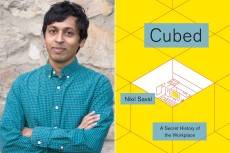September 16, 2014
Exam board introduces workplace issues to psychology A Level syllabus
 One of the UK’s five main national examination boards is to introduce a range of workplace issues as part of its updated Psychology A Level syllabus from next year. Cambridge based OCR claims that Psychology is the UK’s fourth most popular subject at both A and AS level and is also one of the most popular subjects at degree level too. The issues will be introduced to the syllabus as part of an Environmental Psychology theme and will consider as issues such as the effects of allowing desk clutter on individual wellbeing (although it didn’t do much for Kanji Watanabe in Akira Kurosawa’s film Ikiru, above), gender roles in workstation personalisation and so on. Students will be expected to carry out their own research into the topics as well as draw on established sources of information. OCR also suggests that the subject may help to develop the emotional intelligence of those who take the subject.
One of the UK’s five main national examination boards is to introduce a range of workplace issues as part of its updated Psychology A Level syllabus from next year. Cambridge based OCR claims that Psychology is the UK’s fourth most popular subject at both A and AS level and is also one of the most popular subjects at degree level too. The issues will be introduced to the syllabus as part of an Environmental Psychology theme and will consider as issues such as the effects of allowing desk clutter on individual wellbeing (although it didn’t do much for Kanji Watanabe in Akira Kurosawa’s film Ikiru, above), gender roles in workstation personalisation and so on. Students will be expected to carry out their own research into the topics as well as draw on established sources of information. OCR also suggests that the subject may help to develop the emotional intelligence of those who take the subject.







 The world of work and the workplace is always changing. We know it. You know it. In fact, there are a whole host of people that know it, but depending on what side of the professional fence you sit on, you might approach it in different ways, looking through a different lens or with a specific focus. Or are you already bridging the professional gap? Workplace change and the numerous ramifications of it are well documented. In a world that is changing, at frightening pace, it is strange to think that many of the ways in which we work are so entrenched in 20th century thinking. We need to break away from this and outline what the future is going to look like and how we should adapt. Or do we already have the answers? This ground is well trodden. However, it could be time to reassess our thinking and the way we approach this challenge, ensuring it becomes the norm for organisations around the world.
The world of work and the workplace is always changing. We know it. You know it. In fact, there are a whole host of people that know it, but depending on what side of the professional fence you sit on, you might approach it in different ways, looking through a different lens or with a specific focus. Or are you already bridging the professional gap? Workplace change and the numerous ramifications of it are well documented. In a world that is changing, at frightening pace, it is strange to think that many of the ways in which we work are so entrenched in 20th century thinking. We need to break away from this and outline what the future is going to look like and how we should adapt. Or do we already have the answers? This ground is well trodden. However, it could be time to reassess our thinking and the way we approach this challenge, ensuring it becomes the norm for organisations around the world.
 The recent Cabinet reshuffle in the UK Government won’t alter one fact; politicians simply don’t get it when it comes to technology, the workplace, the way people work and the needs of small businesses. Once you dismiss the paranoid idea that they DO get it but don’t care because they’re too busy looking out for The Man, you have to conclude that one of the big problems they have (this won’t go where you think) is that they don’t understand anything about technology and work, especially when it comes to emerging technology, the working lives of individuals, the needs and functions of small businesses and the fact the self-employed exist at all. These things exist outside the bubble. This is obviously a problem because they are implementing policies and making big, uninformed and anachronistic decisions about the things that shape every aspect of our lives, help to define us as people and determine how companies and individuals function. Here are just three examples.
The recent Cabinet reshuffle in the UK Government won’t alter one fact; politicians simply don’t get it when it comes to technology, the workplace, the way people work and the needs of small businesses. Once you dismiss the paranoid idea that they DO get it but don’t care because they’re too busy looking out for The Man, you have to conclude that one of the big problems they have (this won’t go where you think) is that they don’t understand anything about technology and work, especially when it comes to emerging technology, the working lives of individuals, the needs and functions of small businesses and the fact the self-employed exist at all. These things exist outside the bubble. This is obviously a problem because they are implementing policies and making big, uninformed and anachronistic decisions about the things that shape every aspect of our lives, help to define us as people and determine how companies and individuals function. Here are just three examples.









September 16, 2014
The culture of presenteeism is not all just fun and games
by Mark Eltringham • Comment, Flexible working, Workplace, Workplace design
(more…)